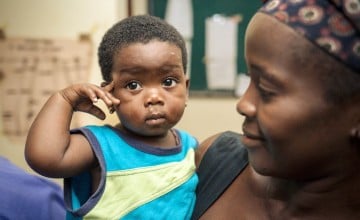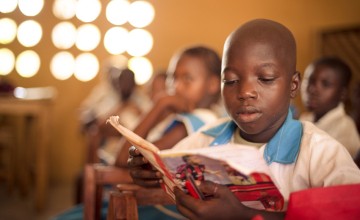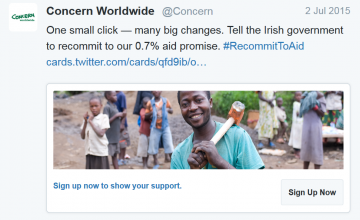
Read our 2024 annual report

Knowledge Hub
Will you play your part in ending extreme poverty?

This September, world leaders have a massive opportunity to set the world on course to eradicate poverty by adopting the UN’s Sustainable Development Goals. Ireland can play an important role.
Caption: Memuniatu Kamara with her young child at the Allen Town PHU in Freetown, Sierra Leone. Photo taken by Michael Duff / Concern Worldwide.
Love him or loathe him, Bono is still a man worth quoting. At Live Aid 2012, he said:
Where you live should not determine whether you live, or whether you die.
Our world today is one of staggering inequality – 856 million people live in extreme poverty globally. The gap between the rich and the poor is growing: a child born in Ireland today can expect to live to 81 years, while a child born today in Sierra Leone can expect to live to just 46 years.
By the end of last year, 805 million people were going hungry; another 2 billion were insufficiently nourished, leading to poor health, lower productivity and decreased life expectancy. As President Michael D. Higgins said:
Global hunger in the 21st century represents the grossest of human rights violations and the greatest ethical challenge facing the global community…the source of this hunger is not a lack of food but the moral affront of poverty, created and sustained by gross inequalities across the world.
In 2014, almost 60 million people were forced from their homes by conflict – a humanitarian crisis unprecedented since World War Two.
Pictures flood our news channels of countries devastated by disaster and conflict, and people forced into extreme action to survive – it’s difficult not to feel overwhelmed by the extent of this human suffering.
Steps forward

Caption: A pupil from Class 3, Baptist Primary School, Rowalla, Sierra Leone. Photo taken by Michael Duff/ Concern Worldwide.
Despite the apparent scale of our problems globally, a recent UN report shows that the world has made encouraging steps forward since the UN’s Millennium Development Goals were set in 2000:
- Poverty rates have more than halved in developing countries
- Maternal mortality rates have declined massively
- The global under-five mortality rate has more than halved
- 91% of the global population is now using an improved water source
- Primary school enrolment in developing regions has also reached 91%
This shows that despite the complexities of the problems, with concerted effort and committed political will, progress can be made: a heartening message as world leaders prepare to meet in September to agree on new Sustainable Development Goals to shape world policy on development over the next 15 years.
Financing development
The UN estimates that the cost of achieving the Sustainable Development Goals will be about $3–5 trillion annually and that funding for this will need to come from a variety of sources – government overseas aid will provide an integral source of income.
The good news is that leaders like Justine Greening, the International Development Secretary in the UK have spoken out strongly in support of these goals:
The international community needs to work harder to ‘level up’ the world by investing more in development, opportunity and equality.
The bad news is that Finland, once one of the world's shining lights in terms of supporting developing countries, has announced that is cutting its overseas aid by 43%.
Ireland’s strong reputation in the area of overseas aid has increased our influence and esteem abroad. A weak position in relation to financing development should not be allowed to undermine this credibility.
#RecommitToAid
Those of you who use Twitter may have seen our recent campaign asking for support for our call on the Irish government to #RecommitToAid. The world needs to pull together to ensure the success of the Sustainable Development Goals and Ireland can play its part by reaching its aid promises of 0.7% of GNP by 2020.

By reaching our 0.7% of GNP overseas aid promise by 2020, Ireland will help make these transformative goals a reality.
Be an active citizen
What else can we do? The answer to this is at one level very simple, and at another quite challenging. There are many, many actions we can take if we are motivated to do so.
Challenge indifference
Challenging prejudice and indifference is vital. We simply can't be apathetic in the face of all the suffering and poverty in the world today. We need to promote active citizenship and the concept of a shared responsibility for global politics.
Be political
Each and every one of us as individuals or in diverse groupings is capable of telling politicians that we want something done about an issue. A first crucial step in supporting the Sustainable Development Goals initiative is to tell those with the political and financial resources to do what needs doing and to make it a priority.
Live justly
One simple and effective formula for living justly is the 5:10:5:10 model:
- 5: Share at least 5% of your gross annual income through supporting organisations of your choice engaged in the work of justice and equality.
- 10: Reducing your use of water, energy and minerals by at least 10%, based on the Irish average per capita consumption.
- 5: Contribute to your local community through volunteering at least 5% of your leisure time in direct, to people and organisations that could use it effectively – the rewards of doing so are huge.
- 10: Taking political action at least ten times a year to ensure that your voice is heard, that the government and companies are aware of your concerns and issues especially as they affect the poor, the hungry and the environment.


